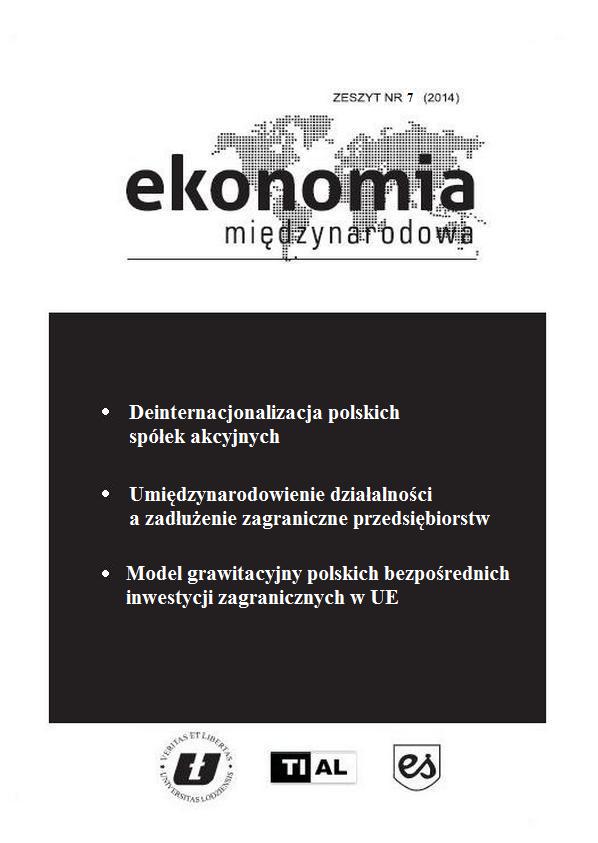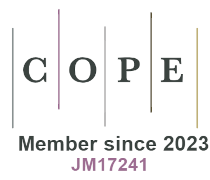Finansowe determinanty deinternacjonalizacji polskich spółek akcyjnych w latach 2008–2011
DOI:
https://doi.org/10.18778/2082-4440.07.01Słowa kluczowe:
deinternacjonalizacja, teoria internacjonalizacji, polskie spółki giełdoweAbstrakt
Celem niniejszego artykułu było zarysowanie obszaru badań nad zagadnieniem deinternacjonalizacji w kontekście polskich przedsiębiorstw. Aby to zrealizować, dokonano przeglądu dotychczas prowadzonych badań oraz podjęto próbę interpretacji deinternacjonalizacji na gruncie modelu uppsalskiego oraz podejścia sieciowego. W artykule podjęto próbę określenia czynników najważniejszych z punktu widzenia polskich podmiotów, decydujących o deinternacjonalizacji przedsiębiorstw. Badaniem objęto sprawozdania finansowe spółek notowanych na rynku podstawowym Giełdy Papierów Wartościowych w Warszawie SA z sektorów: przemysł elektromaszynowy, przemysł chemiczny, przemysł farmaceutyczny, przemysł tworzyw sztucznych. Dokonano estymacji drzew CART dla lat 2008–2011. W świetle uzyskanych wyników zmiennymi, które w największym stopniu wpływały na deinternacjonalizację przedsiębiorstw, są: rentowność sprzedaży w roku poprzednim, stopa wzrostu sprzedaży, wielkość przedsiębiorstwa oraz zmiana wskaźnika kosztów operacyjnych. Uzyskane rezultaty wydają się potwierdzać tezę, że głównym czynnikiem konkurencyjności eksportu polskich przedsiębiorstw są niskie koszty produkcji.
Bibliografia
Bartoloni E. (2010), Capital structure and innovation: causality and determinants, paper presented at the DRIUD Summer Conference 2010, http://www2.druid.dk/ conferences/viewpaper.php?id=501053&cf=43
Google Scholar
Benito G.R.G. (2003), Divestment Seen through the Lens of International Business Strategy, Keynote Lecture given at the International Conference on Divestment: Corporate Strategies, The Regions and Policy Responses, Lisbon, http://www.ceg. ul.pt/divest/Conf/benito_paper.pdf
Google Scholar
Burt S., Dawson J., Sparks L. (2008), International Retail Divestment: review, case studies and (E)merging Agenda, European Retail Research, 22.
Google Scholar
DOI: https://doi.org/10.1007/978-3-8349-8099-1_2
Burt S., Mellahi K., Jackson T.P., Sparks L. (2002), Retail Internationalization and Retail Failure: Issues from the Case of Marks and Spencer, International Review of Retail, “Distribution and Consumer Research”, 12/2: 191–219.
Google Scholar
DOI: https://doi.org/10.1080/09593960210127727
Doryń W. (2010), Koszty internacjonalizacji przedsiębiorstw [w:] Ekonomia, red. Sokołowski J., Sosnowski M., Żabiński A., Prace Naukowe Uniwersytetu Ekonomicznego we Wrocławiu, Wydawnictwo Uniwersytetu Ekonomicznego we Wrocławiu, Wrocław, s. 163–177.
Google Scholar
Ekşi I.H. (2011), Classification of Firm Failure with Classification and Regression Trees, “International Research Journal of Finance and Economics”, issue 76, p. 113–120.
Google Scholar
Ellis P. (2000), Social ties and foreign market entry, „Journal of International Business Studies”, no 31(3), p. 443–469.
Google Scholar
DOI: https://doi.org/10.1057/palgrave.jibs.8490916
Frynas J.G., Mellahi K. (2011), Global Strategic Management, 2nd Edition, Oxford University Press, Oxford.
Google Scholar
Gandolfi F., Strach P. (2008), Retail internationalization: gaining insights from the Wal-Mart experience in South Korea, “Review Of International Comparative Management”, Vol. 10, No. 1.
Google Scholar
Georgopoulos A., Mouratidis K. (2007), Managerial and financial-accounting elements of international divestment: A literature review [in] School of Business and Economics, University of Swansea, UK.
Google Scholar
Gorynia M., Jankowska B. (2007), Teorie internacjonalizacji, „Gospodarka Narodowa”, nr 10/2007.
Google Scholar
Johanson J., Vahlne J.E. (1977), The Internationalization Process of the Firm – a Model of Knowledge Development and Increasing Foreign Market Commitment, “Journal of International Business Studies”, Vol. 8, No. 1.
Google Scholar
DOI: https://doi.org/10.1057/palgrave.jibs.8490676
Johanson J., Vahlne, J.E. (1990), The Mechanism of Internationalization, “International Marketing Review”, Vol. 7, No. 4.
Google Scholar
DOI: https://doi.org/10.1108/02651339010137414
Johanson J., Vahlne J.-E. (2003), Business relationship learning and commitment in the internationalization process, „Journal of International Entrepreneurship”, no 1, p. 83–101.
Google Scholar
Johanson J., Vahlne J.-E. (2009), The Uppsala internationalization process model revisited: From liablity of foreigness to laibility of outsidership, „Journal of International Studies”, No. 40, p. 1411–1431
Google Scholar
DOI: https://doi.org/10.1057/jibs.2009.24
Jung J.C., Bansal P. (2009), How form perofmance affects internationalization, “Management International Review”, issue 9, p. 709–732.
Google Scholar
DOI: https://doi.org/10.1007/s11575-009-0014-7
Kopniak M. (2006), Wiodące czynniki konkurencyjności polskich przedsiębiorstw na rynku UE, [w:] Polskie przedsiębiorstwa wobec globalnej konkurencji, red. J. Kuciński, Wyd. SGH.
Google Scholar
Łapczyński M. (2003), Drzewa klasyfikacyjne w badaniach satysfakcji i lojalności klientów [w:] Analiza satysfakcji i lojalności klientów, StatSoft Polska, Warszawa-Kraków.
Google Scholar
Matthyssens P., Pauwels P. (2000), Uncovering international market-exit processes: A comparative case study, “Psychology & Marketing”, Vol. 17, issue 8, 697–719.
Google Scholar
DOI: https://doi.org/10.1002/1520-6793(200008)17:8<697::AID-MAR3>3.0.CO;2-T
O’Grady S., Lane W. (1996), The Psychic Distance Paradox, “Journal of International Business Studies”, Vol. 27, No. 2.
Google Scholar
DOI: https://doi.org/10.1057/palgrave.jibs.8490137
Osbert-Pociecha G. (1998), Dywestycje w przedsiębiorstwie, Wydawnictwo Akademii Ekonomicznej we Wrocławiu, Wrocław.
Google Scholar
Pauwels P., Patterson P.G., de Ruyter K., Wetzels M. (2009), The propensity to continue internationalization: A study of entrepreneurial decision-making in Australian service firms [in] New Challenges to International Marketing (Advances in International Marketing, Volume 20), Rudolf R. Sinkovics, Pervez N. Ghauri (ed.), Emerald Group Publishing Limited, p. 11–36.
Google Scholar
DOI: https://doi.org/10.1108/S1474-7979(2009)0000020004
Reiljan E. (2005), An analysis of motives behind export withdrawals in Estonia. – Perspectives for Estonian Entrepreneurship in the European Union, Tallinn: Mattimar OÜ, 2005, p. 149–159.
Google Scholar
Swoboda B., Olejnik E., Morschett D. (2011), Changes in Foreign Operation Modes: Stimuli for Increases versus Reductions, “International Business Review”, Vol. 20, 2011, No. 5, p. 578–590.
Google Scholar
DOI: https://doi.org/10.1016/j.ibusrev.2010.11.005
Turcan R. (2003), De-internationalization and the Small Firm’ [in:] Wheeler, C., Mc- Donald, F. and Greaves, I. (eds), Internationalization: Firm Strategies and Management, (Great Britain: Palgrave), p. 208–222
Google Scholar
DOI: https://doi.org/10.1057/9780230514638_13
Turner C., Gardiner P.D. (2007), De-internationalization and global strategy: the case of British Telecommunications (BT), “Journal of Business & Industrial Marketing”, Vol. 22, issue 7.
Google Scholar
DOI: https://doi.org/10.1108/08858620710828863
Turner C. (2011), Coercive deinternationalization and host institutional legitimacy, “European Business Review”, Vol. 23, issue: 2, p. 190–200.
Google Scholar
DOI: https://doi.org/10.1108/09555341111111200
Turner C. (2012), Deinternationalization: towards a coevolutionary framework, “European Business Review”, Vol. 24, issue 2, p. 92–105.
Google Scholar
DOI: https://doi.org/10.1108/09555341211203973
Vissak T. (2008), Nonlinear internationalization during economic transition: the case of Krenholm Group (Estonia). International Business and the Catching-up Economies: Challenges and Opportunities, 34th EIBA Annual Conference, Conference Proceedings: 34th EIBA Annual Conference, Tallinn, December 11–13, 2008. Tallinn: Tallinn University of Technology, 2008, http://eiba2008.ttu.ee/public/Papers/25.pdf
Google Scholar
Velazquez-Razo P.N., Vargas-Hernandez J.G. (2011), The Strategy of De-Internationalization of the SMEs of the Footwear in the Area Metropolitana De Guadalajara, “Gumbad Business Review”, Vol. 6, No. 2., p. 1–11.
Google Scholar
Wysocki J. (2006), Źródła przewagi konkurencyjnej polskich przedsiębiorstw na rynku europejskim [w:] Polskie przedsiębiorstwa wobec globalnej konkurencji, red. J. Kuciński, Wyd. SGH.
Google Scholar
Pobrania
Opublikowane
Jak cytować
Numer
Dział
Licencja

Utwór dostępny jest na licencji Creative Commons Uznanie autorstwa – Użycie niekomercyjne – Bez utworów zależnych 4.0 Międzynarodowe.









